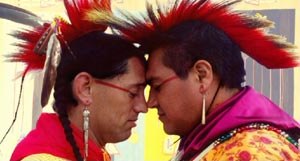 Two-Spirit Contributions
Two-Spirit Contributions
The ongoing success of the annual International Two-Spirit Gathering, the higher profile for Two-Spirit issues in the media, and the national and international release of the documentary film Two Spirits are raising the visibility of Two-Spirit people and their contributions to society. Many indigenous peoples recognized centuries ago the natural complexity of sexuality and gender, and have identified multiple genders and held an honored role for people now described as “LGBT” as ambassadors, healers, counselors, matchmakers, parents to orphaned children, artists, and medicine people who are seen as having special gifts to contribute to the society because of their Two-Spirit status.
Native American scholars are reclaiming ancient beliefs about gender and sexuality that are found in Native cosmology, traditions and ceremonies, and cultural stories. Unfortunately, the research conducted in scholarly circles rarely, if ever, reaches the general public or the media and therefore has not been a focal part of the public advocacy done on behalf of LGBT and Two-Spirit people. For example, in the public debate surrounding marriage rights it has been common to hear unquestioned references to “traditional” marriage without including the voices of Native people who could explain that recognized partnership between people of the same gender has been a part of traditional life on the North American continent for thousands of years. There are critically important lessons to be learned from the way many indigenous people have successfully attended to issues of gender and sexuality, and exploring these ideas will help shape more progressive and humane attitudes and behaviors.
Raising Awareness About Two-Spirit Issues
The Two-Spirit community wants to ensure that Native spirituality is included in interfaith discussions and in the dialogue around LGBT issues taking place in communities of faith. Two-Spirit leaders are working to have Native spirituality included in interfaith coalitions and in the national dialogue taking place between the LGBT community and people of faith to include nature-based cosmologies that respect the variety of ways in which human beings naturally manifest their sexuality and express a range of gender. This information is a welcome addition to the ecumenical dialogue around LGBT issues.
Native Two-Spirit people are more vulnerable to homophobic violence and also to self-inflicted violence and suicide than the general LGBT population. Native LGBT teen suicide is a particularly urgent issue, and clearly a major contributing factor is that many two-spirit youth lack a sense of connection to the inherent dignity and respect that should rightly be afforded Two-Spirit traditions and values. Many Two-Spirit people live in geographic isolation from LGBT resources and/or in cultural separation from their two-spirit traditions. Native LGBT people want to be more connected to each other, and they also want to be more involved in making a difference to LGBT equality work locally, regionally, nationally, and internationally.
Some issues of greatest concern and where more support is needed include: violence reduction, safe schools initiatives, suicide prevention programs, LGBT equality work, religious inclusion efforts, youth at risk programs, marriage equality efforts, anti-discrimination programs in the workplace, racial equality and civil rights work, human-rights initiatives, advocacy for policy change at the local, state, and federal level.
Building On Strengths and Meeting Needs
Two-Spirit people want to be more connected to each other and to their heritage, and to be more involved in making a difference locally, regionally, nationally, and internationally. For thousands of years, many indigenous cultures had traditional roles of authority and leadership for women, same sex relationships were celebrated, transgender people were respected for the contribution they made to society, and there was a place of honor in the culture for people who expressed multiple genders. On the North American continent, people from many tribal traditions have lived for thousands of years in the fully equal kind of life that present-day civil- and human-rights activists are striving to achieve for LGBT people. It is important to bring this history forward to positively influence the future.
The intersection of race, gender identity, sexual orientation, and social justice is deserving of special attention by foundations and individual philanthropists. There has been a long-term lack of funding for the organizational development and capacity-building of individual Two-Spirit groups nationwide, and this lack of funding continues to weaken the Two-Spirit community’s collective ability to meet its own needs. The majority economic profile of LGBT Native people is poor or working poor and this status is unfortunately reinforced by the lack of opportunity afforded Two-Spirit people as they face discrimination in their own tribal communities and in the culture at large. It is essential that that the Two-Spirit community finally receive the funding and organizational development and capacity-building support necessary to address basic needs and to establish the ability of the community to meet its objectives of health, stability, and cultural revitalization.
The leaders and activists of the Two-Spirit movement are working to shape more progressive national attitudes toward gender and sexuality with the general public and within tribal communities. Two-Spirit people are making the most of the increased awareness generated by the film Two Spirits and other resources to build the framework for long-term development and by working with public sector partners, foundations, philanthropists, and tribal leaders. Thank you for your help in raising awareness and visibility and for sharing the information and stories that make a difference.
At age 82 I have actively fought the idea that transgender is primarily about sexuality fot the past 50 yeqrs. Jungian psychology recognizes an unconscious contrasexual persona as the anima/animus hidden within each of us. If this becomes conscious we begin to exhibit the ‘two spirit persona’. The argument that ‘two-spirit’ is grossly misunderstood is why I think you are onto something. One argument is that the seperation of the sexes in childhood tends block a basic instinct and is a major factor in the fantasies the sexes project on each other. I applaud your mission!
James Q. Burgess (aka Jamie Elizabeth), ex-Appalachian hillbilly, professional engineer & amateur philosopher retired in Florida